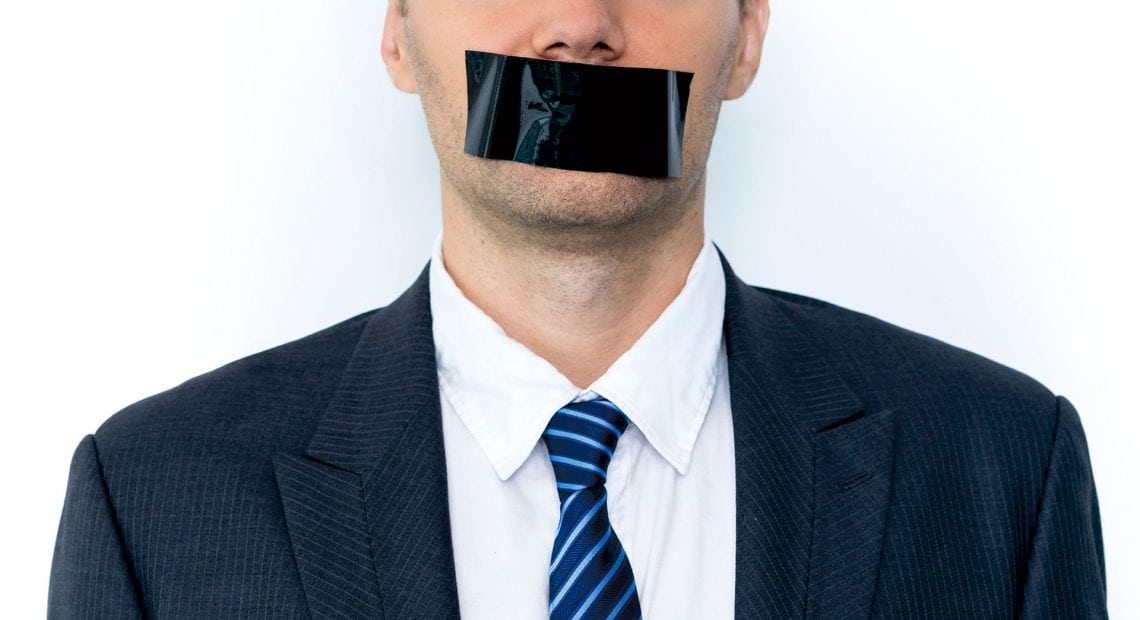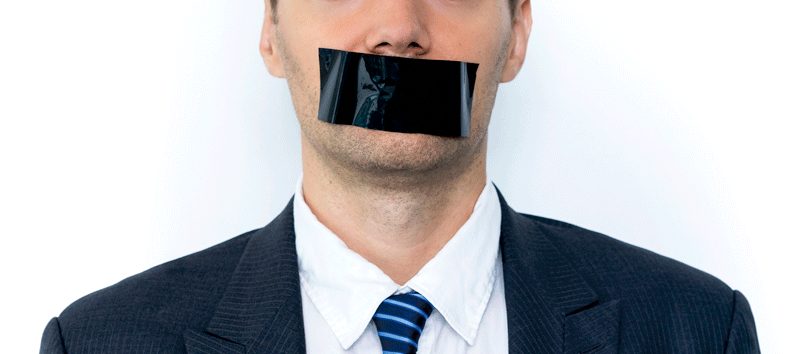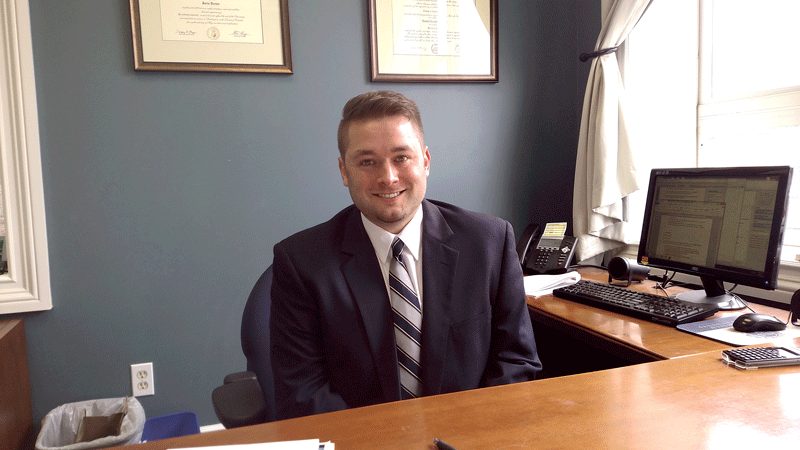
Free Speech in the Workplace Can Be a Thorny Topic
Shades of Gray
 Recent high-profile issues around free speech in the workplace — from the NFL’s new national-anthem policy to ABC’s blackballing of Roseanne Barr — have elicited much debate in the public square, with the point often made that private-sector employees have no right to free expression. But that’s not exactly true — or, at least, it’s not as black-and-white as some might believe. That fact creates uncertainty for employers, who must balance their own interests with their employees’ very human desire to speak their mind.
Recent high-profile issues around free speech in the workplace — from the NFL’s new national-anthem policy to ABC’s blackballing of Roseanne Barr — have elicited much debate in the public square, with the point often made that private-sector employees have no right to free expression. But that’s not exactly true — or, at least, it’s not as black-and-white as some might believe. That fact creates uncertainty for employers, who must balance their own interests with their employees’ very human desire to speak their mind.
When NFL Commissioner Roger Goodell, backed by 31 of 32 owners, announced a new national-anthem policy last month, they hoped it would quell an issue that seemed to be dying down on its own.
They were wrong, to judge by the wave of debate — in the media, online, and among players — that followed, and promises to bleed into the 2018 season. Even President Trump, whom the NFL hoped to placate with the new policy, only intensified his tweeted attacks on players and teams — a tactic he knows plays well to his base.
The new policy removes the existing requirement that players be on the field during the playing of the national anthem, but does require that players who are on the field must stand, and authorizes the NFL to fine teams whose players violate this policy. Supporters of forcing players on the field to stand have repeatedly argued — in internet comment boards and elsewhere — that private employees have no free-speech rights in the workplace.
But is that true?
To a significant degree, it is, area employment lawyers say, but the issue is far more gray than the black-and-white terms on which it’s often debated.
“Obviously, the Bill of Rights is a constraint on government action; clearly, the First Amendment doesn’t restrict what a private-sector employer can do or not do” when it comes to establishing workplace rules, said Timothy Murphy, an attorney with Skoler, Abbott & Presser. “And, if you think about it, the vast majority of employees work in the private sector and are at will, and can be terminated for any reason, as long as it’s not illegal.”
However, he went on, according to the National Labor Relations Board (NLRB), employees are generally protected when speaking out on issues that impact the workplace. In other words, companies can’t just fire an employer over anything he or she says on social media, even criticism of the company itself — particularly if that criticism specifically targets an employee policy or the workplace environment. In fact, the NLRB has likened such talk to water-cooler chatter, only in a more public forum.

Tim Murphy says private-sector workers have far fewer free-speech rights than public-sector workers — but that doesn’t mean they have no rights.
“If you’re taking a knee because you’re concerned about police brutality, are you making a statement on an issue of mutual concern that impacts your workplace?” Murphy asked. “The NLRB does tend to take a broad view of what impacts your workplace. Would something like that be viewed as protected speech under the NLRB? I don’t know.”
Because the NFL’s anthem-policy changes were not collectively bargained with its unionized workforce, they may be susceptible to legal challenge, notes Michael McCann, a sports-law expert who writes for Sports Illustrated. But, intriguingly, free expression of this kind may find even more protection now than before, if a player chooses to file a complaint, because he could argue that kneeling is also a protest against an onerous, hastily implemented workplace policy.
“Players could argue that such a change will impact their wages, hours, and other conditions of employment,” McCann notes. “To that end, a player could insist that, while the new policy does not lead to direct league punishments of players, it nonetheless adversely affects the employment of players who do protest in ways that violate the new policy.”
It’s just one example of many of the ways in which free speech in the workplace is an amorphous beast, pulling in competing issues of discrimination, harassment, and other labor laws.
“That’s why people like me have jobs. The law provides a lot of areas for employers to get in trouble doing things that seem like common sense,” said Daniel Carr, an attorney with Royal, P.C. “It’s entirely reasonable for employers to think employees being critical of them at work are guilty of some egregious conduct, but they may not realize that criticism does contain some protected rights.”
Power to the People
Because the NLRB has established a bit of a record on this front, the issue of speaking out against an employer on social media is a bit clearer right now than other, related situations.
“Generally, if the speech is oriented toward addressing some workplace condition or benefit, if it’s targeted toward concerted activity for the mutual benefit of workers, that can have the largest amount of protection,” Carr said. “But it’s sometimes unclear where the lines are. If you say, ‘company X is awful,’ well, how are they awful? Do they treat their employees badly? That might be protected.”

Daniel Carr says employees generally have the right to speak out about work conditions, but it’s sometimes unclear where the lines are.
Even without specifics, he went on, the NLRB has often come down on the side of employees, he noted. For example, saying “the products they sell are terrible” might be protected if someone works on commission, and the product really is terrible, so they don’t sell a lot of them.
“My thinking is, if you work for company X, you couldn’t go online and say, ‘do business with company Y.’ That crosses a line,” he added. “But the NLRB does have a lot of protections for employees criticizing their own companies, and even moreso if the criticism is based on the way employees are treated, or other conditions of employment.”
What to make, then, of the NLRB’s statement in January that Google didn’t violate labor laws last summer when it fired engineer James Damore? He was terminated after distributing a memo criticizing the company’s diversity program.
He filed a complaint, and Jayme Sophir, associate general counsel with the NLRB, concluded that, while some parts of Damore’s memo were legally protected by workplace regulations, “the statements regarding biological differences between the sexes were so harmful, discriminatory, and disruptive as to be unprotected.”
Sophir made it clear that, in this case, an employer’s right to enforce anti-discrimination and anti-harassment policies permits it to restrict the kinds of speech that could lead to a hostile workplace.
“Where an employee’s conduct significantly disrupts work processes, creates a hostile work environment, or constitutes racial or sexual discrimination or harassment,” she noted, “the board has found it unprotected even if it involves concerted activities regarding working conditions.”
Indeed, Carr noted, as one example, employers are expected to grant accommodations for religious expression — certain dress codes, or short breaks for prayer — but not necessary for proselytizing to co-workers.
“There’s a lot of gray area where somebody’s religious beliefs may conflict with somebody else’s protected rights,” he said. “For example, if you have a religious belief against gay marriage, you don’t necessarily have the right to advocate for that in the workplace, where you might potentially discriminate against a gay employee. There are a few areas of anti-discrimination law where one person’s right conflicts with another person’s.”
Even clearer are employers’ rights when it comes to online speech by employees that has nothing to do with work conditions but theatens to cause the company embarrassment or reputational harm — such as ABC shutting down its hit show Roseanne last month after its namesake star, Roseanne Barr, fired off a racist tweet comparing Valerie Jarrett, a prominent African-American woman, to an ape.
Barr’s case is muddled by the fact that the public doesn’t know what stipulations she might have agreed to in her contract — and, considering her past tendencies to be controversial, such stipulations would probably be a wise move by the network.
“That certainly deals with a private employer’s ability to sanction speech it doesn’t agree with,” Murphy noted, adding that employers have much more to worry about in this realm than it did a decade or more ago. “These days, reputational damage can go viral at the drop of a hat, and employers want to be able to act to protect their brands.”
To measure the speed at which this can happen, look no further than the Justine Sacco debacle of 2013. A senior corporate communications director for IAC, an international media firm, she began tweeting travel-related jokes from Heathrow Airport while waiting to board a flight from London to South Africa. The last one was a joke intended ironically: “Going to Africa. Hope I don’t get AIDS. Just kidding. I’m white!” Then she turned off her phone. By the time she turned it back on in Cape Town, she was famous.
Although Sacco had only 170 Twitter followers, tens of thousands of angry responses to her ‘joke’ flooded Twitter, and she even became a trending hashtag, #HasJustineLandedYet — all in the space of a few hours. By day’s end, IAC had fired her. She’s certainly not the only employee to run afoul of an employer’s right to protect its brand through such a termination; Barr is just the latest in a long string of cases.
Public or Private?
It’s clear, Carr said, that private-sector employees need to be more careful about what they say than government employees, who do have greater protections.
“It is true that the First Amendment does not apply to private actors; there has to be a government actor. And there’s even some gray area in terms of what is and what is not a private employer,” he said, citing, for example, the example of a private contractor working on a government project.
“It gets tricky because these free-speech kinds of issues are often less about free speech and the First Amendment and more about labor law,” he said, citing, as one example, anti-discrimination laws that protect employees against being fired for religious reasons. “You don’t have an unfettered right to political speech in a private workplace, but there may be some overlapping and intermingling of, say, political speech with protected speech.”
For example, he noted, “the policies that political figures make do often affect the workplace, and insofar as employees have a right to engage in concerted activity, that can become a gray area. For example, somebody is advocating for a candidate that is proposing to pass anti-union legislation, then you’re clearly intermingling political speech with issues of labor law.”
Murphy noted that these issues tend to proliferate around election time, and employers often handle them on an ad hoc basis as they arise. “Employers want a civil workplace, but they don’t want to seem like heavy-handed censors. I’ve never seen a policy that deals with talking politics or the issues of the day at work; in general, employers say, ‘for everybody’s sanity, let’s try not to ratchet this up too much.’ Because these issues reflect society, and there can be a lot of hard feelings.”
On the matter of off-duty speech, on the other hand, employers are often taken aback by what the law and NLRB rulings actually say, Murphy said. “Is off-duty misconduct something employers have a right to weigh in on or sanction? Most employers say, ‘yes, we do, if it impacts our reputation or customers.’”
Some wrinkles of labor law have decades of case guidance behind them, Carr noted, while others are fairly new — social media being a prime example. “As each successive change in the law occurs, there’s a huge lag in getting guidance from judges. And for every law that’s passed, it’s impossible for us to predict all the possible eventualities. That’s what the judicial system is for — to interpret the law and define those edges.”
That said, he added, there has been a feeling in the legal world that the NLRB under the current administration may be amenable to clawing back some of the speech protections it originally granted employees.
“The pendulum is swinging back a little bit,” Murphy agreed. “They’re actually looking anew at some of those decisions and rules about employers’ handbooks and social-media policies. Generally, under the NLRB, you can speak out about matters of mutual concern among employees. But that’s fluid.”
At the end of the day, he went on, employers simply want a productive workforce and resist anything that might stir the pot, whether it’s a peaceful demonstration in favor of racial justice, an unhinged tweet that promotes racial strife, or something in between.
“There are people who say we’ve become less tolerant as a society and we’re not respectful enough of opposing viewpoints. They say, ‘get out of the bunker and listen to your employees; you don’t necessarily need to be censors,’” Murphy said. “But an employer’s primary responsibility is to protect that business and brand. That’s what they’re up against.”
Joseph Bednar can be reached at [email protected]





